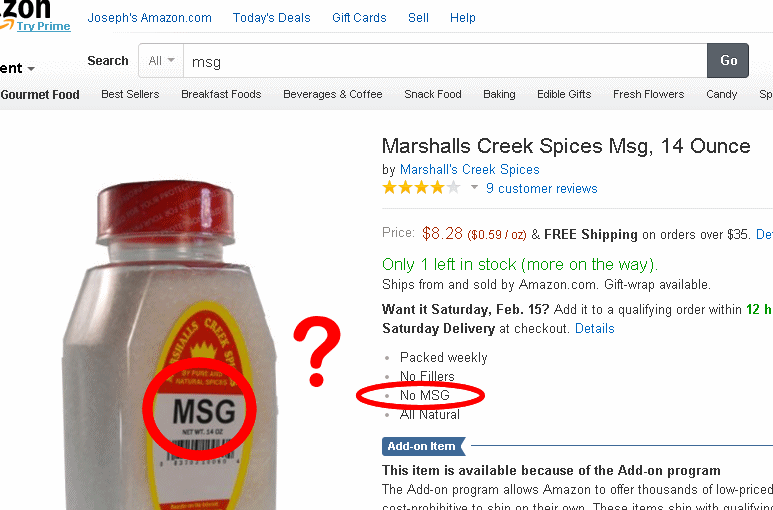The Science of Nutrition
#261
Boost Pope


iTrader: (8)
Join Date: Sep 2005
Location: Chicago. (The less-murder part.)
Posts: 33,022
Total Cats: 6,589
I convinced myself that the MSG Myth was just that years ago, though admittedly with little hard science to support that viewpoint. Of late, you've had me doing a lot of searching on the topic, and what I'm finding is interesting.
Among "trustworthy" sources (eg: those involving proper control / blinding techniques, those published in peer-reviewed journals or as academic theses, and not coming from laypersons who have an obvious financial motivation such as the sale of books, herbal remedies, etc) 100% of the material which I have found completely refutes the idea that MSG consumption leads to long-term negative health consequences in humans, and fairly little of it even acknowledges that MSG, specifically, is physiologically correlated with acute, short-term symptoms of the sort you describe.
A few abstracts:
Because glutamate is one of the most intensely studied food ingredients in the food supply and has been found safe, the Joint Expert Committee on Food Additives of the United Nations Food and Agriculture Organization and World Health Organization placed it in the safest category for food additives. Despite a widespread belief that glutamate can elicit asthma, migraine headache and Chinese Restaurant Syndrome (CRS), there are no consistent clinical data to support this claim. In addition, findings from the literature indicate that there is no consistent evidence to suggest that individuals may be uniquely sensitive to glutamate.
Glutamate. Its applications in food and contribution to health
---
Since the first description of the 'Monosodium glutamate symptom complex', originally described in 1968 as the 'Chinese restaurant syndrome', a number of anecdotal reports and small clinical studies of variable quality have attributed a variety of symptoms to the dietary ingestion of MSG.
(...)
Despite concerns raised by early reports, decades of research have failed to demonstrate a clear and consistent relationship between MSG ingestion and the development of these conditions.
Monosodium glutamate []allergy’: menace or myth? - Williams - 2009 - Clinical & Experimental Allergy - Wiley Online Library
---
Since the first report of the so-called Chinese restaurant syndrome 40 years ago, clinical trials have failed to identify a consistent relationship between the consumption of MSG and the constellation of symptoms that comprise the syndrome. Furthermore, MSG has been described as a trigger for asthma and migraine headache exacerbations, but there are no consistent data to support this relationship. Although there have been reports of an MSG-sensitive subset of the population, this has not been demonstrated in placebo-controlled trials.
(...)
Despite a widespread belief that MSG can elicit a headache, among other symptoms, there are no consistent clinical data to support this claim. Findings from the literature indicate that there is no consistent evidence to suggest that individuals may be uniquely sensitive to MSG. Nurse practitioners should therefore concentrate their efforts on advising patients of the nutritional pitfalls of some Chinese restaurant meals and to seek more consistently documented etiologies for symptoms such as headache, xerostomia, or flushing.
Reconsidering the effects of monosodiu... [J Am Acad Nurse Pract. 2006] - PubMed - NCBI
---
Monosodium glutamate (MSG) has a long history of use in foods as a flavor enhancer. In the United States, the Food and Drug Administration has classified MSG as generally recognized as safe (GRAS). Nevertheless, an ongoing debate exists concerning whether MSG causes any of the alleged reactions. A complex of symptoms after ingestion of a Chinese meal was first described in 1968. MSG was suggested to trigger these symptoms, which were referred to collectively as Chinese Restaurant Syndrome. Numerous reports, most of them anecdotal, were published after the original observation. Since then, clinical studies have been performed by many groups, with varying degrees of rigor in experimental design ranging from uncontrolled open challenges to double-blind, placebo controlled (DBPC) studies. Challenges in subjects who reported adverse reactions to MSG have included relatively few subjects and have failed to show significant reactions to MSG. Results of surveys and of clinical challenges with MSG in the general population reveal no evidence of untoward effects. We recently conducted a multicenter DBPC challenge study in 130 subjects (the largest to date) to analyze the response of subjects who report symptoms from ingesting MSG. The results suggest that large doses of MSG given without food may elicit more symptoms than a placebo in individuals who believe that they react adversely to MSG. However, the frequency of the responses was low and the responses reported were inconsistent and were not reproducible. The responses were not observed when MSG was given with food.
http://jn.nutrition.org/content/130/4/1058.full.pdf
Last edited by Joe Perez; 02-06-2014 at 09:25 PM. Reason: Schpelling
#262
Boost Pope


iTrader: (8)
Join Date: Sep 2005
Location: Chicago. (The less-murder part.)
Posts: 33,022
Total Cats: 6,589
And that's fine. If you have convinced yourself of this, then it's not my place to try and change your mind, nor would I want to attempt to do so.
I do question the validity of your test methodology, and would ask that you at least consider the notion that psychosomatic symptoms do in fact exist. For instance, here is an excerpt from an amateur experiment which attempts to follow proper scientific method, and produces interesting results:
In other words, it is possible that you feel bad after consuming MSG because you have convinced yourself that you feel bad after consuming MSG.
I do question the validity of your test methodology, and would ask that you at least consider the notion that psychosomatic symptoms do in fact exist. For instance, here is an excerpt from an amateur experiment which attempts to follow proper scientific method, and produces interesting results:
... Renton also writes about experimenting on a friend of his named Nic, who claimed to have adverse reactions to MSG: Renton feeds him a meal full of the MSG and closely related naturally occurring glutamates that are found in a huge range of foods including tomatoes, cheese, Marmite, seaweed and Worcester sauce. But Nic feels no pain or adverse reaction after his glutamate-stuffed meal.
That's because he did not know he was eating MSG and other glutamates: like everyone else who complains of allergy or adverse reactions to MSG, Nic has psyched himself into believing that the benign substance makes him feel bad.
(...)
In China, where I live, you don't hear many complaints about MSG allergy. They're too busy gorging themselves on the stuff. Chinese people consume 1.6m to 1.8m tonnes of MSG crystals every year,
(...)
Nor do Italians complain about headaches after eating parmesan cheese (which tastes good because of the glutamates in it), Japanese don't worry about eating too much seaweed or dried shrimp (ditto), and even in Britain you don't often hear whining about adverse reactions to Marmite (ditto); you certainly don't get warnings from your doctor about the dangers of human breast milk to babies (ditto).
(...)
The persistence of the Chinese restaurant syndrome myth is a symptom of the hypochondria that has become fashionable in contemporary Anglo-American culture, and the failure of our educational systems to teach people the difference between quackery and hard science.
Full text: Why MSG allergy is fake science | Jeremy Goldkorn | Comment is free | theguardian.com
That's because he did not know he was eating MSG and other glutamates: like everyone else who complains of allergy or adverse reactions to MSG, Nic has psyched himself into believing that the benign substance makes him feel bad.
(...)
In China, where I live, you don't hear many complaints about MSG allergy. They're too busy gorging themselves on the stuff. Chinese people consume 1.6m to 1.8m tonnes of MSG crystals every year,
(...)
Nor do Italians complain about headaches after eating parmesan cheese (which tastes good because of the glutamates in it), Japanese don't worry about eating too much seaweed or dried shrimp (ditto), and even in Britain you don't often hear whining about adverse reactions to Marmite (ditto); you certainly don't get warnings from your doctor about the dangers of human breast milk to babies (ditto).
(...)
The persistence of the Chinese restaurant syndrome myth is a symptom of the hypochondria that has become fashionable in contemporary Anglo-American culture, and the failure of our educational systems to teach people the difference between quackery and hard science.
Full text: Why MSG allergy is fake science | Jeremy Goldkorn | Comment is free | theguardian.com
In other words, it is possible that you feel bad after consuming MSG because you have convinced yourself that you feel bad after consuming MSG.
#263
Boost Pope


iTrader: (8)
Join Date: Sep 2005
Location: Chicago. (The less-murder part.)
Posts: 33,022
Total Cats: 6,589
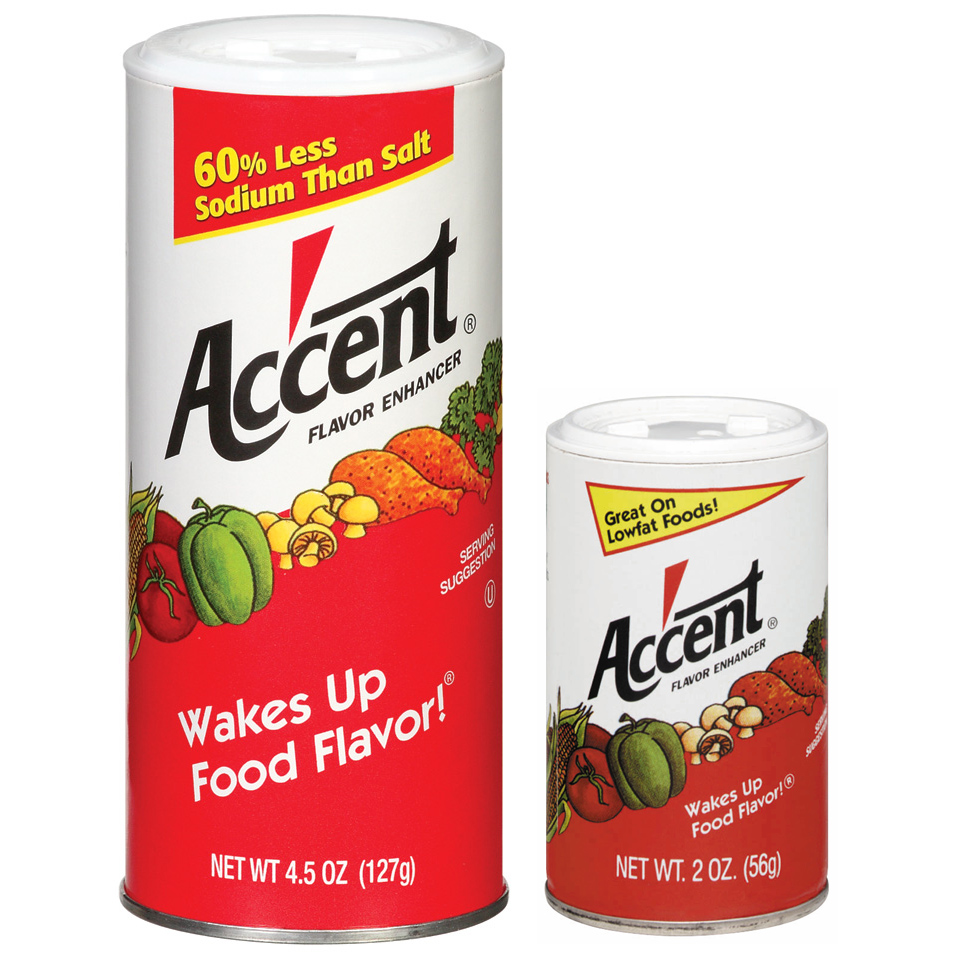
#264
Good discussion on MSG, thanks Joe for doing the homework. To clear a few things.
1. I had symptoms of headache, thirst, sweating and twitches before I knew ANYTHING about MSG. One day a friend was like this has MSG and told me about it.
2. How much MSG do you guys use? Because of the following,
3.
I checked your links and some links which they linked to. Let me quote two things "virtually all studies since then confirm that monosodium glutamate in normal concentrations has no effect on the overwhelming majority of people"
“Just like salt and sugar, it exists in nature, it tastes good at normal levels, but large amounts at high concentrations taste strange and aren’t that good for you,” Dr. Chaudhari said.
I don't really know all about MSG but I am willing to study more when I have a little bit more time BUT, from seeing what you linked too, it does not seem to take away from the chance that a portion of the population, could be sensitive to it, and or that portion size can make a big difference. Perhaps I was putting too much, and that that creates conditions of dehydration which leads to headaches and twitches? I am open to that idea. I guess I would like to then see if eating too much salt has the same effect. Maybe MSG has stronger dehydrating properties?? I have no idea and it sounds like it's worth researching...
But I got like a 100 pages to read for classes so this will have to be for another day.
Oh and just to add, I still sometimes have food with some MSG and I don't always have the symptoms and I think its because I eat very little BUT, my *** is healthy as hell and I NEVER, except when the sulfur in the air is especially bad from the volcano, have headaches. I know it's not hard science BUT, I know my body pretty well. I am truth and science oriented but regarding this, I must say, I trust my body to stay away from it and will let research catch up.
Keep us updated on your findings though, thanks Joe.
Edit: and thinking back at it though, I remember how much I was using. If I used the same amount of salt as I did MSG in my soups, I dont think I would get the headaches but it's worth trying out back to back.
1. I had symptoms of headache, thirst, sweating and twitches before I knew ANYTHING about MSG. One day a friend was like this has MSG and told me about it.
2. How much MSG do you guys use? Because of the following,
3.
I checked your links and some links which they linked to. Let me quote two things "virtually all studies since then confirm that monosodium glutamate in normal concentrations has no effect on the overwhelming majority of people"
“Just like salt and sugar, it exists in nature, it tastes good at normal levels, but large amounts at high concentrations taste strange and aren’t that good for you,” Dr. Chaudhari said.
I don't really know all about MSG but I am willing to study more when I have a little bit more time BUT, from seeing what you linked too, it does not seem to take away from the chance that a portion of the population, could be sensitive to it, and or that portion size can make a big difference. Perhaps I was putting too much, and that that creates conditions of dehydration which leads to headaches and twitches? I am open to that idea. I guess I would like to then see if eating too much salt has the same effect. Maybe MSG has stronger dehydrating properties?? I have no idea and it sounds like it's worth researching...
But I got like a 100 pages to read for classes so this will have to be for another day.
Oh and just to add, I still sometimes have food with some MSG and I don't always have the symptoms and I think its because I eat very little BUT, my *** is healthy as hell and I NEVER, except when the sulfur in the air is especially bad from the volcano, have headaches. I know it's not hard science BUT, I know my body pretty well. I am truth and science oriented but regarding this, I must say, I trust my body to stay away from it and will let research catch up.
Keep us updated on your findings though, thanks Joe.
Edit: and thinking back at it though, I remember how much I was using. If I used the same amount of salt as I did MSG in my soups, I dont think I would get the headaches but it's worth trying out back to back.
Last edited by Hinano; 02-07-2014 at 02:02 AM.
#266
Boost Pope


iTrader: (8)
Join Date: Sep 2005
Location: Chicago. (The less-murder part.)
Posts: 33,022
Total Cats: 6,589
I'd caution merely against the pitfall of mistaking correlation for causality.
As an example, in 2011, Dr. Ka He of the University of North Carolina published a study in the American Journal of Clinical Nutrition, in which he studied 10,000 Chinese adults aged 18-65 over a period of several years, and concluded that there was a positive statistical correlation between the intake of high doses of MSG and weight gain. (full text)
The problem with that, and the thing which the popular press in the US and Europe failed to consider when republishing snippets of his findings, was that Dr. He never actually claimed that MSG causes weight gain, only that Chinese adults who consumed a large amount of it tended to gain weight. In fact, that very same study was later cited in a paper entitled "A lack of epidemiologic evidence to link consumption of monosodium L-glutamate and obesity in China."
Of course, that same segment of the population who tend to consume meals rich in MSG also tended to have a higher caloric intake overall, to lead a more sedentary lifestyle, to smoke, and in general to be less healthy overall. So why wouldn't they be expected to gain weight?
#267
Boost Pope


iTrader: (8)
Join Date: Sep 2005
Location: Chicago. (The less-murder part.)
Posts: 33,022
Total Cats: 6,589
The first is chronic (long-term) effects, such as claims that MSG causes neurological harm by way of the ill-defined "excitotoxic damage." 100% of all available scholarly research conclusively and unambiguously disproves these claims.
The second is acute (short-term) effects, which may also be further subdivided into questions as to whether a certain percentage of the population are abnormally glutamate-sensitive.
The last of the four papers which I linked to previously, from Geha et al, entitled Review of Alleged Reaction to Monosodium Glutamate and Outcome of a Multicenter Double-Blind Placebo-Controlled Study does a really good job of approaching this question.
To summarize, the authors both reviewed existing literature and also conducted several original trials using proper control and blinding techniques, to look specifically for correlations between MSG consumption and the acute symptoms commonly described (headache, chest pain, flushing, etc) in those individuals who self-identify as being sensitive to MSG. I urge you to read the paper fully (it's not long, and is an easy read), but I'll point out a few highlights:
We recently conducted a multicenter DBPC (double-blind,
placebo-controlled) challenge study in 130 subjects to analyze
the response of subjects who report symptoms from ingesting
MSG. The results suggest that large doses of MSG given
without food may elicit more symptoms than a placebo in
individuals who believe that they react adversely to MSG.
However, the frequency of the responses was low and the
responses reported were inconsistent and were not reproducible.
The responses were not observed when MSG was given with food.
A drink vehicle with a novel taste that could
effectively mask the taste of MSG was used to challenge
individuals who believed themselves to be MSG sensitive. Of
30 such individuals with whom contacts were made, only six
agreed to be tested. When these individuals were challenged
with 6 g of MSG in a double-blind, placebo-controlled manner,
it was found that four of the six did not react to either
substance, whereas two reacted to both MSG and placebo. Of
the subjects who reacted, one reported tingling of hands and
warmth behind the ears after both MSG and placebo; the
other subject experienced tightness of the face after ingesting
either substance. The remaining four individuals who had
ascribed their previous symptoms such as headache, nausea,
tongue swelling and uncontrollable coughing to MSG ingestion,
did not react to either substance (Kenney 1986).
Here we have a very well carried-out test, which focuses specifically on individuals who already believe themselves to be adversely affected by MSG, using a blind trial comparing MSG to a placebo in a vehicle which, somewhat uniquely, denies the subject any ability to detect the difference in taste between the two (this is a key factor missing from most earlier studies.) effectively mask the taste of MSG was used to challenge
individuals who believed themselves to be MSG sensitive. Of
30 such individuals with whom contacts were made, only six
agreed to be tested. When these individuals were challenged
with 6 g of MSG in a double-blind, placebo-controlled manner,
it was found that four of the six did not react to either
substance, whereas two reacted to both MSG and placebo. Of
the subjects who reacted, one reported tingling of hands and
warmth behind the ears after both MSG and placebo; the
other subject experienced tightness of the face after ingesting
either substance. The remaining four individuals who had
ascribed their previous symptoms such as headache, nausea,
tongue swelling and uncontrollable coughing to MSG ingestion,
did not react to either substance (Kenney 1986).
When these individuals were tested, none of them reported an adverse reaction to MSG while reporting no reaction to a placebo. Or put another way, they reported the same reaction to a placebo as they did to MSG.
Clinical studies with MSG ingested with food.
Studies in
which MSG was administered with food have shown an absence
of CRS symptoms. Oral administration of up to 147 g/d
of MSG to adult humans as the sole source of nonessential
nitrogen for 2–6 wk appeared to cause no clinical pathologic
changes, and no CRS symptoms were manifest (Bazzano et al.
1970).
When 3 g MSG was
administered in 150 mL of beef bouillon at lunch time to 73
healthy subjects either in an open label or double-blind design
with each subject acting as his or her own control, no differences
in symptomatology were found between the control and
MSG-treated groups (Morselli and Garattini 1970, Zanda et
al. 1973).
In a study to examine the absorption of glutamic
acid from solutions of MSG or a casein hydrolysate, 60 mg
MSG/kg casein hydrolysate or a mixture of the two were
administered to 12 healthy adults; no general ill effects were
observed (Marrs et al. 1978). In other studies, 60–150 mg
MSG/kg body weight was given to 14 adults and 13 infants
with a typical Chinese rice porridge meal. No adverse reactions
were observed (Tung and Tung 1980).
Unlike the previous, which looked specifically at high-doses of MSG all by itself, the data above examine high doses of MSG in an otherwise normal meal, and reveal absolutely no adverse results whatsoever. Studies in
which MSG was administered with food have shown an absence
of CRS symptoms. Oral administration of up to 147 g/d
of MSG to adult humans as the sole source of nonessential
nitrogen for 2–6 wk appeared to cause no clinical pathologic
changes, and no CRS symptoms were manifest (Bazzano et al.
1970).
When 3 g MSG was
administered in 150 mL of beef bouillon at lunch time to 73
healthy subjects either in an open label or double-blind design
with each subject acting as his or her own control, no differences
in symptomatology were found between the control and
MSG-treated groups (Morselli and Garattini 1970, Zanda et
al. 1973).
In a study to examine the absorption of glutamic
acid from solutions of MSG or a casein hydrolysate, 60 mg
MSG/kg casein hydrolysate or a mixture of the two were
administered to 12 healthy adults; no general ill effects were
observed (Marrs et al. 1978). In other studies, 60–150 mg
MSG/kg body weight was given to 14 adults and 13 infants
with a typical Chinese rice porridge meal. No adverse reactions
were observed (Tung and Tung 1980).
So is any of this absolutely conclusive? Well, it's darn close. If we accept this data as true, then it is possible (though not statistically probable), that a very small percentage of the population may react adversely to high doses of MSG taken all by itself without food. This same group, however, exhibits a strong tendency to report the same symptoms when they believe that they are consuming MSG but are instead given a placebo.
Last edited by Joe Perez; 02-07-2014 at 09:55 AM.
#268
2 Props,3 Dildos,& 1 Cat


iTrader: (8)
Join Date: Jun 2005
Location: Fake Virginia
Posts: 19,338
Total Cats: 573
I had intended to link to a scale that measures body fat percentage. like this one:
Truly a "butt dyno"
#270
Boost Pope


iTrader: (8)
Join Date: Sep 2005
Location: Chicago. (The less-murder part.)
Posts: 33,022
Total Cats: 6,589
Wow. MSG *AND* grains in the same cart? Are you trying to kill yourself?

This is the conveyance of MSG which I am most familiar with:
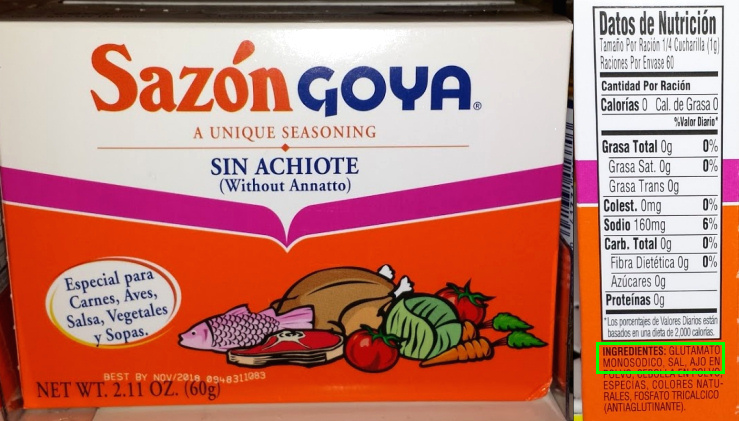
Goya Sazon is a staple seasoning in Latin-American cooking, and is found in every self-respecting kitchen in the Caribbean. Cuban women put this on everything- meat, seafood, frijoles negros, you name it.
Of course, it's only about 75% MSG, and it also contains a few other ingredients (garlic, cumin, saffron) which complement the cuisine of the islands rather well, but would tend to clash with the Cantonese palate. I managed to track down some Accent over the weekend while up in Catskill, and so I now have my very own bottle of pure, undiluted MSG as well:
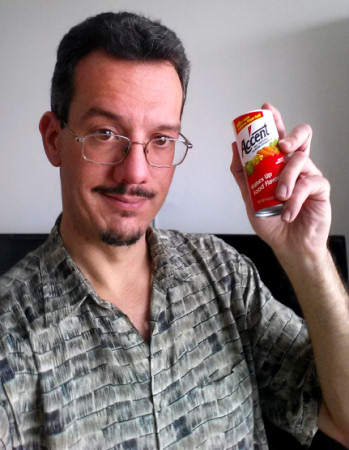
(In retrospect, I would imagine that I probably could have just ridden down to Chinatown and gotten some there.)
I've also re-discovered the pleasure of cooking. Started emulating some of the dishes I've had from Precious in my own kitchen, such as tonight's entree of grilled chicken with string beans, in a pineapple-chili sauce (with lots of chili, a healthy dose of pure MSG, some powdered ginger and grated orange rind), with a side of short-grain brown rice.
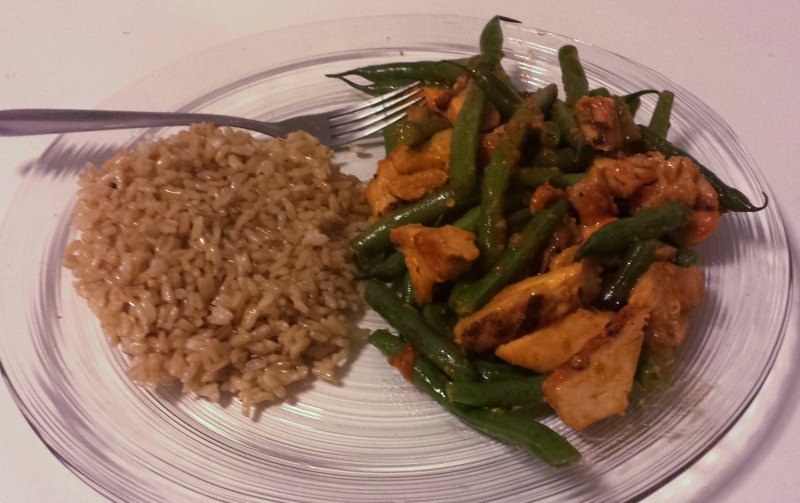
Deeeee-lish.

This is the conveyance of MSG which I am most familiar with:

Goya Sazon is a staple seasoning in Latin-American cooking, and is found in every self-respecting kitchen in the Caribbean. Cuban women put this on everything- meat, seafood, frijoles negros, you name it.
Of course, it's only about 75% MSG, and it also contains a few other ingredients (garlic, cumin, saffron) which complement the cuisine of the islands rather well, but would tend to clash with the Cantonese palate. I managed to track down some Accent over the weekend while up in Catskill, and so I now have my very own bottle of pure, undiluted MSG as well:

(In retrospect, I would imagine that I probably could have just ridden down to Chinatown and gotten some there.)
I've also re-discovered the pleasure of cooking. Started emulating some of the dishes I've had from Precious in my own kitchen, such as tonight's entree of grilled chicken with string beans, in a pineapple-chili sauce (with lots of chili, a healthy dose of pure MSG, some powdered ginger and grated orange rind), with a side of short-grain brown rice.

Deeeee-lish.
Last edited by Joe Perez; 02-10-2014 at 08:30 PM.
#271
2 Props,3 Dildos,& 1 Cat


iTrader: (8)
Join Date: Jun 2005
Location: Fake Virginia
Posts: 19,338
Total Cats: 573
While you jokers were out buying umami, this guy was whipping up this:
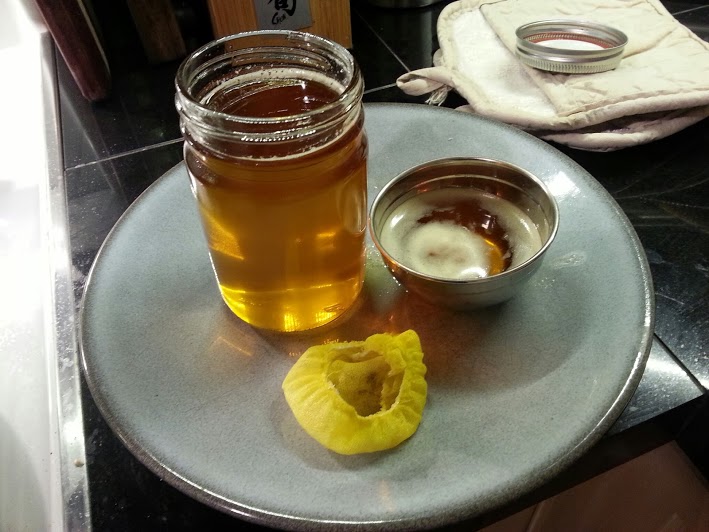
ingredients: butter
recipe: bring to a boil over med-hi heat, on medium simmer 7-10 minutes until golden.
Now... amazon sells various types of MSG and I should probably get some.

ingredients: butter
recipe: bring to a boil over med-hi heat, on medium simmer 7-10 minutes until golden.
Now... amazon sells various types of MSG and I should probably get some.
#272
Boost Pope


iTrader: (8)
Join Date: Sep 2005
Location: Chicago. (The less-murder part.)
Posts: 33,022
Total Cats: 6,589
I'm starting to get good at these:

Chicken breast pan-seared until well-browned, with fresh string beans and frozen snow peas, some finely-chopped chilis, a dollop of storebought sesame-teryaki sauce, a healthy dose of Sriracha, some sliced pickled ginger, and of course, a decent sprinkling of pure MSG.
I do need to start using all fresh veggies- the frozen stuff just isn't cutting it anymore in terms of texture, and given that I have three hippie / organic grocers within a few blocks, there's just no excuse for not dropping by every other evening for a fresh take.
Chicken breast pan-seared until well-browned, with fresh string beans and frozen snow peas, some finely-chopped chilis, a dollop of storebought sesame-teryaki sauce, a healthy dose of Sriracha, some sliced pickled ginger, and of course, a decent sprinkling of pure MSG.
I do need to start using all fresh veggies- the frozen stuff just isn't cutting it anymore in terms of texture, and given that I have three hippie / organic grocers within a few blocks, there's just no excuse for not dropping by every other evening for a fresh take.
#275
Boost Pope


iTrader: (8)
Join Date: Sep 2005
Location: Chicago. (The less-murder part.)
Posts: 33,022
Total Cats: 6,589
I'm kind of wondering where everyone has gone lately. This thread seems to be quieting down just at a time when it was becoming quite interesting...
#276
Great, windows shut down to do an update without asking, just as I was finishing a long reply. Here's a shortened version.
Perhaps it's the combo of MSG and something else that causes symptoms in some individuals.
Re: starch intake - my original hypothesis may only be true for a subset of the population, and can change depending on gut flora. My own starch tolerance has greatly increased after regular raw potato powder (fermentable fiber) intake, which feeds the good bacteria, so much so that despite now having modest rice/potato intake, my 5-pack is starting to show up (4 dinner rolls and a meat loaf). My blood sugar numbers are better than ever (70-85 fasting and pre-meal, <120 post meal peak despite modest amounts of starch). Maybe Joe never had too much antibiotics and always had enough fermentable fiber to maintain his gut flora.
A fairly recent discovery has shown that the intestines and gut flora play a huge role in blood sugar regulation (and thus bodyfat regulation) and starch digestion.
Joe if you love brown rice, at least prepare it properly by soaking it to reduce the anti-nutrients:
Most Effective Way to Reduce Phytic Acid in Brown Rice | Kitchen Stewardship | A Baby Steps Approach to Balanced Nutrition
Perhaps it's the combo of MSG and something else that causes symptoms in some individuals.
Re: starch intake - my original hypothesis may only be true for a subset of the population, and can change depending on gut flora. My own starch tolerance has greatly increased after regular raw potato powder (fermentable fiber) intake, which feeds the good bacteria, so much so that despite now having modest rice/potato intake, my 5-pack is starting to show up (4 dinner rolls and a meat loaf). My blood sugar numbers are better than ever (70-85 fasting and pre-meal, <120 post meal peak despite modest amounts of starch). Maybe Joe never had too much antibiotics and always had enough fermentable fiber to maintain his gut flora.
A fairly recent discovery has shown that the intestines and gut flora play a huge role in blood sugar regulation (and thus bodyfat regulation) and starch digestion.
Joe if you love brown rice, at least prepare it properly by soaking it to reduce the anti-nutrients:
Most Effective Way to Reduce Phytic Acid in Brown Rice | Kitchen Stewardship | A Baby Steps Approach to Balanced Nutrition
Last edited by JasonC SBB; 02-14-2014 at 12:52 PM.
#278
Boost Pope


iTrader: (8)
Join Date: Sep 2005
Location: Chicago. (The less-murder part.)
Posts: 33,022
Total Cats: 6,589
Joe if you love brown rice, at least prepare it properly by soaking it to reduce the anti-nutrients:
Most Effective Way to Reduce Phytic Acid in Brown Rice | Kitchen Stewardship | A Baby Steps Approach to Balanced Nutrition
Most Effective Way to Reduce Phytic Acid in Brown Rice | Kitchen Stewardship | A Baby Steps Approach to Balanced Nutrition
For the moment, my immediate takeaway is that it would seem that opinions concerning the "evilness" of phytic acid are not universally shared, even outside of the mainstream academic / medical community. For instance:
Phytic acid’s preventative properties:
CANCER
Foods higher in phytic acid seem to enhance the activity of natural killer cells and inhibit tumor growth.
Those who consume more phytic acid are less likely to succumb to breast and prostate cancer. Exposing the colon to less iron seems to decrease the risk of colon cancer.
CARDIOVASCULAR DISEASE
Phytic acid helps prevent hardening of the arteries and platelet formation.
KIDNEY STONES
With some phytate being excreted in the urine, this may improve kidney health and prevent stones.
INSULIN RESISTANCE
Phytic acid plays a role in pancreatic function and insulin secretion. And it may reduce the glycemic response from meals, meaning you feel full for longer.
In the balance
Is phytic acid worth worrying about? Maybe not, for most of us.
One study showed that subjects consuming a Mediterranean-style diet that included 1000-2000 mg of phytic acid per day did not suffer from reduced mineral bioavailability.
At the same time, certain people might have to be more wary.
In particular, iron intake and absorption can be critical for infants nearing six months of age. So when plants are added to infants’ diets, it may be important to adopt strategies to reduce phytic acid and enhance iron absorption.
Summary and recommendations
In healthy people eating balanced diets, phytic acid’s effects on iron, zinc, and manganese status is minimal and it doesn’t seem to cause nutrient deficiencies.
To argue that some plant foods are “unhealthy” because of their phytic acid content seems mistaken, especially when phytic acid’s potential negative effects on mineral assimilation may be offset by its health benefits.
Source: Precision Nutrition » All About Phytates (Phytic Acid)
I'll also note that the particular brown rice which I am using is pre-germinated, and that the label on the back contains a hilarious error which makes me question whether eating germinated brown rice might cause some kind of neurotoxic harm:
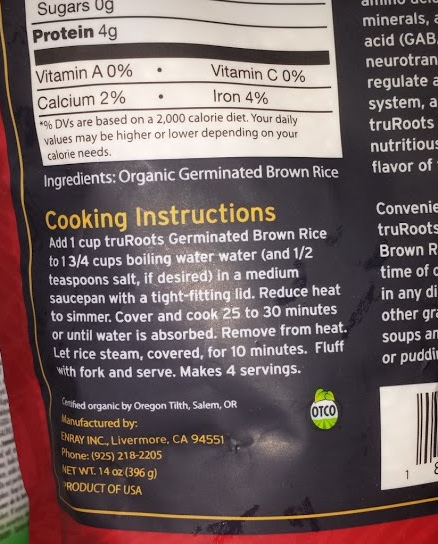
#279
I didn't mention that the soaking reduces lectins.
What Are Lectins and Why Should We Care? | Norcal Strength & Conditioning
The Lowdown On Lectins | Mark's Daily Apple
What Are Lectins and Why Should We Care? | Norcal Strength & Conditioning
The Lowdown On Lectins | Mark's Daily Apple
#280
Boost Pope


iTrader: (8)
Join Date: Sep 2005
Location: Chicago. (The less-murder part.)
Posts: 33,022
Total Cats: 6,589
I'd say there are a lot of things you didn't mention. 
But seriously, I'm just going to quote the first two sentences of the first link you posted there, so that everyone can soak them in (pun intended):
Riiiiiiiiiiiiiiiiiiight.
Anyway, moving on...
Weight seems to be holding for the moment right around 200-201, which is interesting. Based again on subjective analysis (eg: I didn't buy Y8s' fancy scale), I seem to be replacing fat with muscle, as I have hit the innermost notch on my belt and had to punch a new one, and my size 38 pants are now officially way too lose.
Makes me wonder if the low-carb / high-fat / no-grain diet was causing harm to my health and metabolism which went beyond simple weight gain...

But seriously, I'm just going to quote the first two sentences of the first link you posted there, so that everyone can soak them in (pun intended):
We all know that sugar is bad for us, that legumes should be avoided and it’s obvious that gluten is the devil. Right!?!?!
It's obvious that gluten is the devil. Riiiiiiiiiiiiiiiiiiight.

Anyway, moving on...
Weight seems to be holding for the moment right around 200-201, which is interesting. Based again on subjective analysis (eg: I didn't buy Y8s' fancy scale), I seem to be replacing fat with muscle, as I have hit the innermost notch on my belt and had to punch a new one, and my size 38 pants are now officially way too lose.
Makes me wonder if the low-carb / high-fat / no-grain diet was causing harm to my health and metabolism which went beyond simple weight gain...





